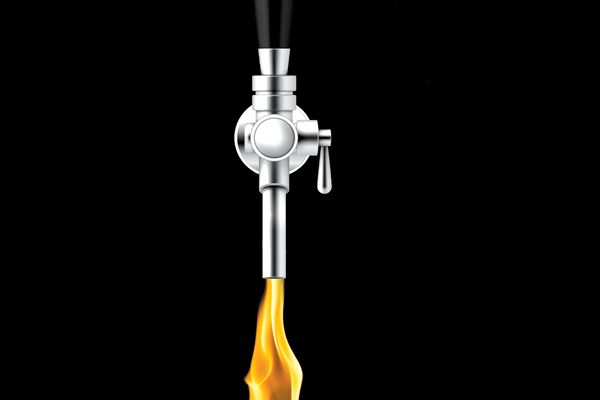By the time you read this, the predicted deluge of rain and wooly sweater weather will likely have walloped the Sea to Sky, and memories of our multi-month drought and hot spell will be smothered by a flood of cosy mitten memes. Mind you, people will say you can’t always predict the weather—or election results, for that matter.
While pollsters might agree on the second point after the latest municipal elections, for decades, scientists and sci-fi writers have been blaring out predictions about weirdly smoky skies and parched lands. Most people just didn’t care to believe them.
After one of our finest meteorologists, Johanna Wagstaffe, retweeted some of B.C.’s scarier record highs right after election day, this comment came from Torrance Coste at the Wilderness Committee (which, BTW, was co-founded by the venerable 81-year-old Paul George, Order of B.C. recipient, and partner of Adriane Carr, founding member of the Green Party of BC, my former geography instructor at journalism school, and three-term Vancouver Green councillor, who thankfully got back on city council this go-round): “I remember listening to the climate change podcast 2050: Degrees of Change from CBC and @JWagstaffe when it first came out, and thinking the forecasts of temperatures in the twenties and skies choked with wildfire smoke in November seemed hard to imagine.” Indeed.
People also thought the too-hot sun and submerged cities forcing most of humanity to huddle in the Arctic and Antarctic in J. G. Ballard’s 1962 The Drowned World were pretty out there, too.
But I remind you that the world’s largest oil and gas company, now ExxonMobil, knew about climate change and its ties to burning fossil fuels since at least 1977. That was only 15 years after Ballard’s “unbelievable” fiction. And 11 years before one of my heroes—NASA scientist James Hansen, whom I was lucky enough to meet (yes, press passes are amazing door openers, for any of you young’uns considering a career in journalism)—testified about same before Congress.
According to an article in Scientific American, which includes some great quotes from Harvard history of science professor Naomi Oreskes (another personal hero I got to meet at the World Conference for Science Journalists), the company then spent millions denying it. That included pointed misinformation campaigns to confuse the public around the late ’70s, when I remember my uncle and other Alberta farmers first puzzling over the snowpack, which is vital for moisture for seeding spring crops and was unusually low.
Fake news ain’t new, baby. But social media now amplifies it to mind-curdling levels.
The day after muni elections, 25 temperature records were broken in B.C. Pemberton hit 21.5 C, breaking the 1960 record. In Squamish, it was 25.8, topping a 20-year record, and Vancouver hit 20.2—the third time in October the mercury topped 20.
Add to that the widespread drought plaguing B.C. and beyond. Between July and mid-October, Vancouver received only 16 millimetres of rain—that’s like the depth of the dregs in your coffee cup. The average is 165 mm! Victoria received two paltry mm versus an average of 110 mm. And Whistler got only 60 mm, versus nearly 290 mm for the same period last year. (Sorry, I can’t find average monthly precip numbers for Whistler. If anyone knows where I can, let me know!)
The Sunshine Coast, the Island, Metro Vancouver, and northeastern B.C., which includes some fine farmland—all are suffering Level 5 drought conditions, so when it rains, the soil is so hydrophobic, it may just run off.
On Vancouver Island, Port Alberni was the smokin’ hot spot, busting the 1907 high of 23.3 by three degrees. In October. Autumn. Remember? When usually seasonal highs are in the low teens, and we admire coloured, not crispy burnt leaves?
Speaking of smoke, I’m sure that hasn’t been lost on you either, including the Cypress Mountain fire. According to CTV, BC Wildfire Service reports that 63 new fires were detected from Oct. 6 to 12, nearly five times the average for this time of year. Many of them are burning east of the Fraser Valley, and more of our finest farmland.
The air quality index for Hope two days after the election was over 300—the worst air quality in Canada, and more than 45 times WHO guidelines. Think of all those teeny polluting particles settling in lungs—human and otherwise—and on all the trees and plants and waterways from here to beyond the Okanagan and Lytton.
Maybe one of the saddest temperature records set Sunday was 22.6 C in Bella Bella, where researchers estimate some 65,000 salmon, mostly pinks, died earlier this month in an unusually warm, low stream. This fall, hundreds of thousands of salmon have likely died in B.C.
Salmon populations in the Yukon and Alaska are sharply declining, too, and as they do, Indigenous communities are lamenting the loss not only in terms of an age-old food supply, but for cultural and spiritual reasons, too. These diminutions run deep.
There go the salmon. And if you think I’m kidding about the beer and milk, check out an Oct. 13 report by Fernando Valladares in The Conversation (“Droughts could leave us without milk, beer, and so much more.”) It describes how Spain, Argentina and Brazil have all been forced to import milk due to drought. (A cow needs more than 100 litres of water a day.) As for beer, lack of rain meant Sunshine Coast breweries and other commercial users were stopped from using local drinking water on Tuesday, Oct. 18.
At the end of his article, Mr. Valladares also reminds us that many politicians, fearing voter backlash, find it difficult to speak out about our climate crisis. I’ll take that one step further: Way too many politicians are scared to take the necessary action to contend with it.
So how did you vote this election? And what steps are you willing for politicians to take?
Glenda Bartosh is an award-winning journalist who twice ran for office just to address the climate file. She didn’t get in.




